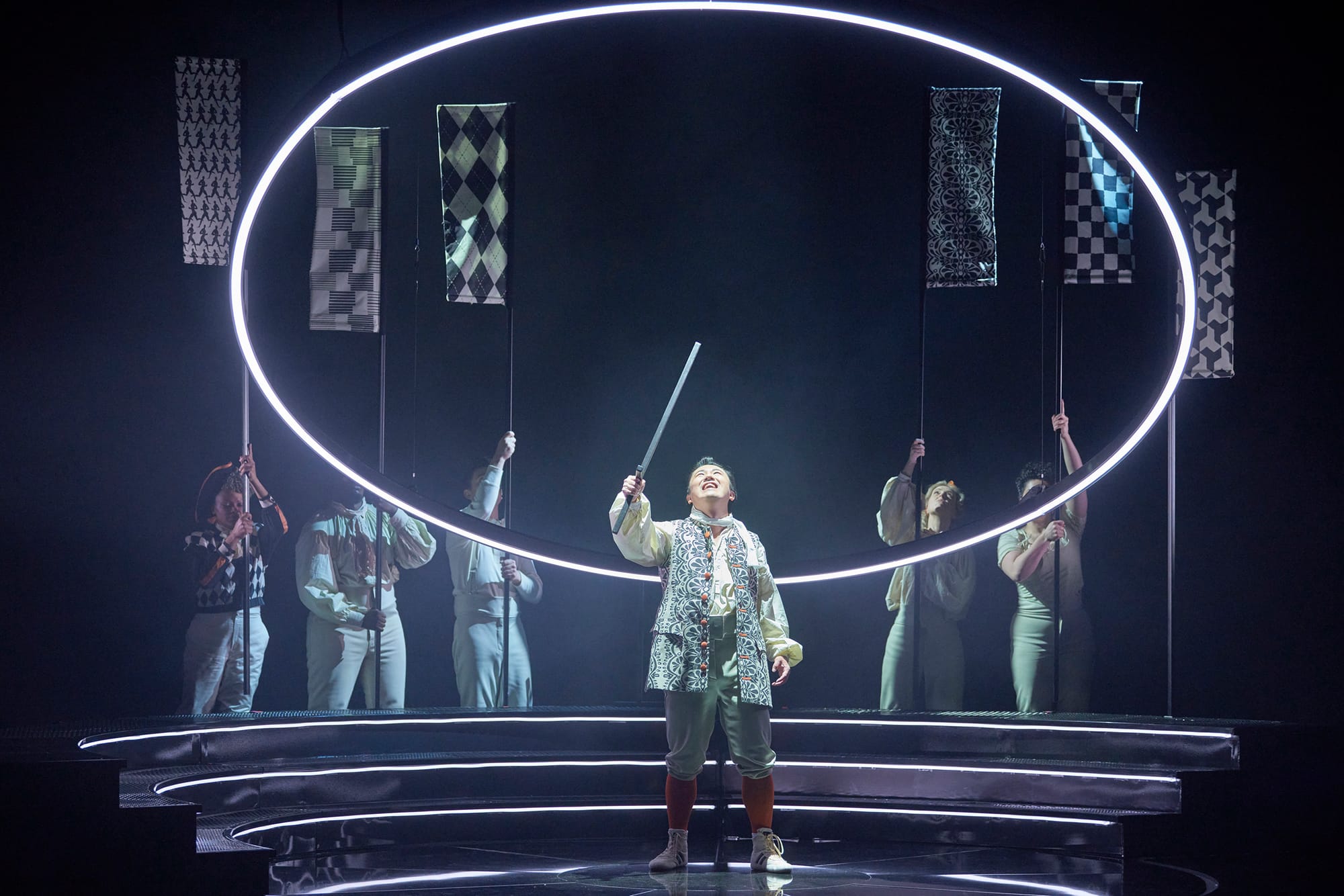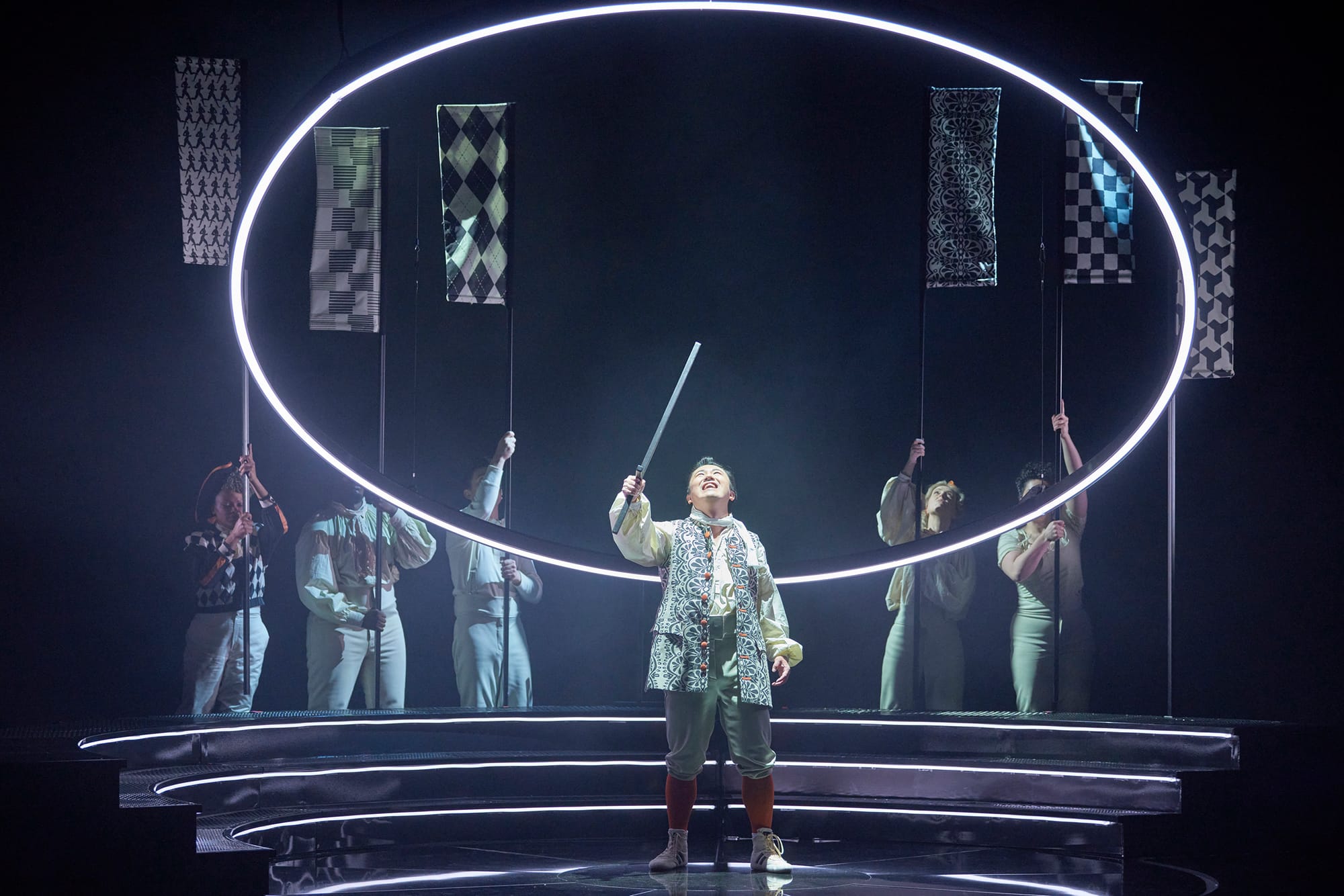
Vivaldi L’Olimpiade, RV 725, Soloists; Orchestra of Irish National Opera / Peter Whelan (director / harpsichord). Linbury Theatre, Royal Opera House, Covent Garden, 13.05.2024
Production:
Director – Daisy Evans
Costume & Set Designs – Molly O’Cathain
Lighting Design – Jake Wiltshire
Movement Director – Matthew Forbes
Cast:
Licida – Meili Li
Clistene – Chuma Sijeqa
Aristea – Alexandra Urquiola
Megacle– Gemma Ní Bhriain (walking); Maria Schellenberg (singing)
Alcandro – Séan Boylan
Argene – Sarah Richmond
Aminta – Rachel Redmond
Vivaldi opera is (hopefully) in the ascendent. When Irish National Opera brought Bajazet to the Linbury Theatre of the Royal Opera House in 2021, the result was revelatory, the production rightly lauded left, right and centre (review). And now Vivaldi’s 1733 opera L’Olimpiade, nicely timed for the modern Olympics this year in Paris. The two operas Bajazet and L’Olimpiade complement each other well: the former Rothko-dark, the latter brighter, competitive, and full of mind-melting plot twists. Vivaldi opera seems to be in the position Handel opera occupied a few short decades ago: largely unknown but with performances sprouting up that are carrying the message forwards. May the interest in Vivaldi blossom: how wonderful it would be to see a proliferation of stagings. And, in this scenario, Irish National opera would be remembered as a vital link in the chain of discovery.
The libretto to L’Olimpiade is by Metastasio, originally written for a setting by Caldara in 1733. It is loosely based on “The Trial of the Suitors” from Book Six of The Histories of Herodotus. The setting is Ancient Greece, specifically just after the completion of the Olympic Games. Irish National Opera’s leaflet helpfully begins not by relating the action, but by presenting the salient couples: King Clistene and Filinto (Clistene’s abandoned son, and therefore nto in the cast list); Aristea and Megacle; Licida and Argene; Licida and Megacle.
The opera begins as the Games end: the King has promised the hand of his daughter Aristea to the winner. Licida wants to impress his father the King in the games and plans to win and marry Aristea; to achieve his, Megacle, whose life Licida saved previously, competes disguised as Licida. Which is fine, except that Megacle has previously enjoyed a romantic attachment to Aristea himself. Megacle wins in the games (as Licida). This being Baroque opera, there is zero chance of it ending there; Megacle lets out his deception to Aristea, leaving her bereft.
I love the way the plot summary provided just says ‘chaos ensues,’ as if all had been perfectly clear and convivial up to then. There is another twist: Licida turns out to be the King’s long-lost son.
No wonder there are 50-60 settings of this libretto (including by Cimarosa, Cheubini and Arne, plus an incomplete opera by Donizetti). It is some sort of Baroque opera archetype, seemingly exhibiting just about every trope.
Daisy Evans’ staging is a triumph of the power of simplicity. As an audience we enter into a different era as characters take clothes off a rack to don character. A luminous (Olympic) ring hovers over the stage; emotions are reflected and evoked through simple but effective colour changes. Olympic games themselves are brilliantly mimed. Evens states she was inspired by Aristotelian techniques (she does not state exactly how, but I take it to be a dissection and interlocking of the six elements of drama: plot; character; theme; diction; music; and spectacle. Together with designer Molly O’Cathain, Evans presents this idea in an amphitheatre-inspired set. Colours are influenced by those of Greek pottery (clay, ‘high-shine black,’ and ash). The miming of the games echoes depictions on Greek pottery (and does so highly effectively).
But the characters are mainly clothed according to the styles of the 1730s – so there is a double-lens going on here, the distancing from ancient times to the 18th century, and from the 18th century to now. Although the libretto does not actually include gameplay itself, Evans has the base costume of characters (before they don the 1730’s ones for the action itself) as a modern sports uniform.
The first night was not only a triumph, it was a bone fide triumph over adversity. Firstly, the singer for the part of Megacle, Gemma Ní Bhriain, was vocally (but not physically) indisposed, so walked the part, with Maria Schellenberg singing the part in the pit, where she was situated along with the ten-piece orchestra (Pablo Fitzgerald’s lute enhanced the continuo of Peter Whelan’s harpsichord and Sarah McMahon’s cello; a superbly varied and sensitive group). Then, during the first act, there was a medical emergency that caused a complete cessation of the performance for around 15-20 minutes – the interval was somewhat curtailed as a result.
But, Vivaldi triumphed. Enhanced by the basic yet powerfully functional set, the music shone. The instrumental group was on superb form, tireless throughout, and Peter Whelan’s speeds seemed perfect to allow the music space without ever dragging and often injecting just the right sense of urgency; the use of small ensemble gave great transparency, too (compare, for example, with the Hungaroton recording of L’Olimpiade from the Hungarian State Opera, where full-orchestra strings are more handicap than advantage).
Chinese counter-tenor Meili Li took the role of Licida, superb of tone and musicality but perhaps with diction less clear than his colleagues. Entering fully into the regal spirit, baritone Chuma Sijeqa exuded power with tremendous stage presence and a voice to match. Unfortunately, I missed out on Sijeqa’s Opera Holland Park debut as the Poacher in The Cunning Little Vixen in 2021 as he cancelled for covid reasons, so it was good to hear him here. Another baritone, Seán Boylan, sang Alcandro strongly.

But it was the Argene of Sarah Richmond that, for me, was the finest role assumption of the night, perfectly pitched dramatically, vocally and with clarity of diction; she made the most of a smaller role and turned it to triumph. That is not to take anything from the pyrotechnics and histrionics of Rachel Redmond’s Aminto, though: a fiery assumption.
There is only one soprano role in this opera, that of Aristea, radiantly (and virtuosically) sung by Alexandra Urquiola. The cast really did not have a weak link; the concentration was held throughout, and in adversity, by the players. Irish National Opera triumphs again … one wonders which Vivaldi opera they have up their sleeve next …










